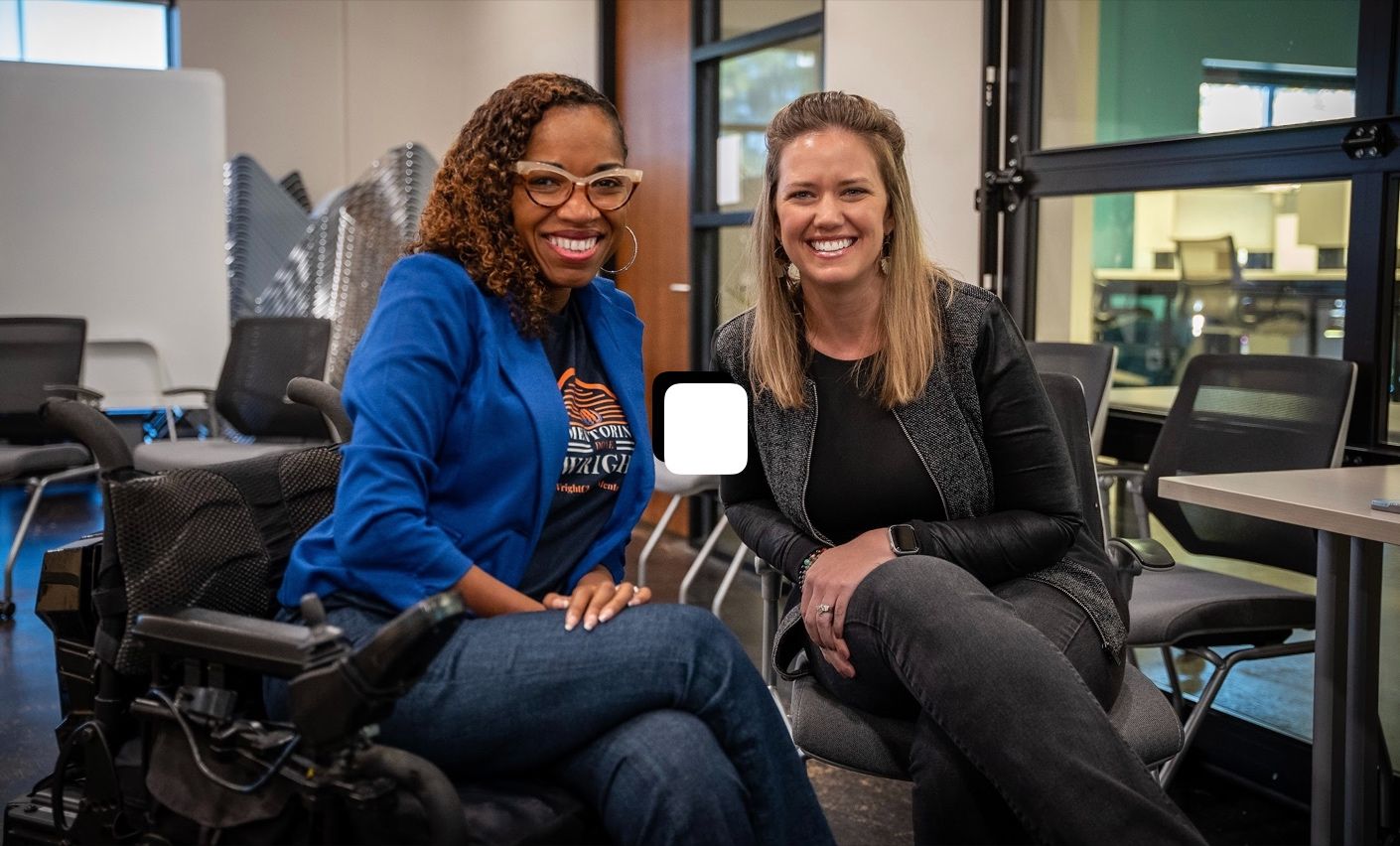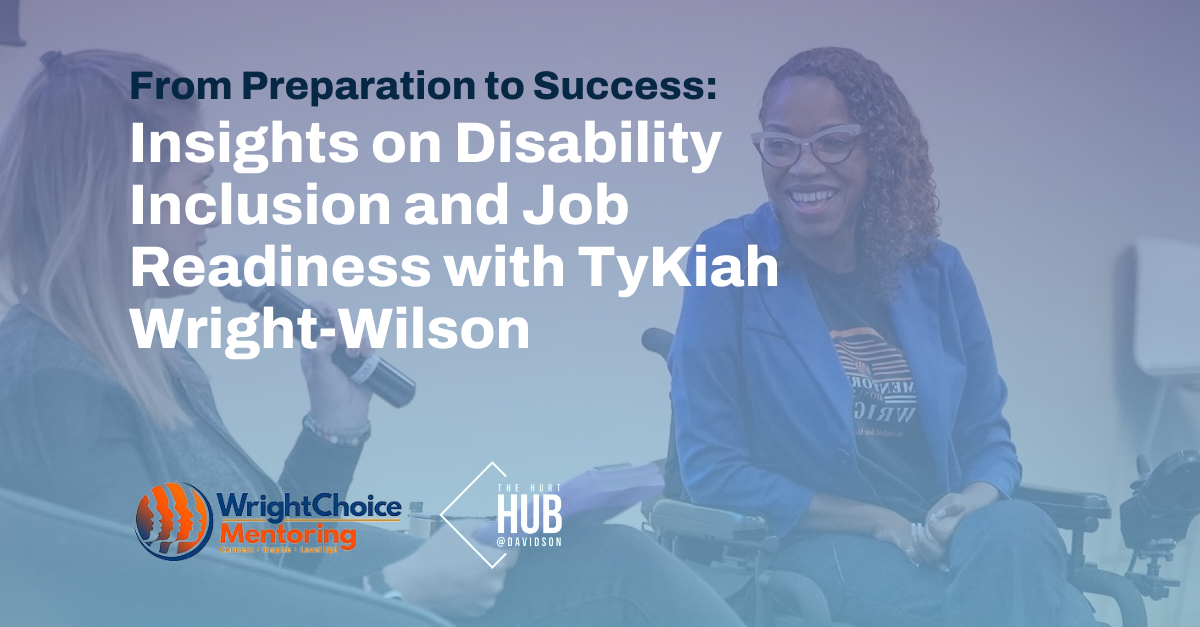What happens when mentorship meets intentionality, and inclusion goes beyond buzzwords? TyKiah Wright-Wilson unpacked these ideas and more during a recent fireside chat we shared together at The Hurt Hub @ Davidson, hosted by Davidson College’s Disability Alliance.
As a social entrepreneur and visionary leader, TyKiah shared her perspectives and lived experiences on disability inclusion, mentorship, and preparing young adults with disabilities for the workforce. As the CEO of WrightChoice Mentoring, TyKiah has spent over 20 years connecting students to meaningful opportunities, fostering leadership, and breaking barriers for people with disabilities. Below are highlights from our conversation.

Q: The power of mentorship lies in its ability to connect people in ways that amplify both the mentor and mentee’s strengths and goals, creating opportunities that ripple far beyond the relationship itself. You created a transformative mentorship program with WrightChoice Mentoring. Tell us about your journey and “why” behind founding this organization.
TyKiah: When I think back to my college years at Wright State University, I remember them as some of the most formative and joyful years of my life. Wright State is one of the top schools in the country for including people with disabilities in the mainstream campus, and that experience shaped my leadership skills. I was constantly involved—student government, budget board, the African American caucus—and these opportunities allowed me to build the relationships and boldness needed to pursue big ideas.
Starting WrightChoice wasn’t part of my original plan. I initially thought I’d work a traditional 9-to-5 job, but I quickly realized that wasn’t the path I was meant to take. WrightChoice became a bridge to help young people who came after me access opportunities I didn’t have—mentorships, internships, and connections that could silence the noise of stereotypes during interviews.
Q: Mentorship is clearly a cornerstone of your work. What makes your approach to matching mentors and mentees unique?
TyKiah: Relationships are at the heart of what I do. It’s about being bold enough to reach out, form connections, and say, ‘Here’s why this relationship will matter—for you and for them. We don’t just throw people together and say, ‘Voilà!’ It’s very intentional. First, we interview students to understand their career goals—whether they’re freshmen figuring things out or seniors ready to graduate. Then, we look for mentors who align with those goals and interests.
It’s not just about professional connections; we also consider personal attributes, hobbies, and values. I want mentors and mentees to connect on a human level. It’s those little shared details that bring heart into the relationship and make the experience meaningful for both.I tell mentors, ‘This relationship will benefit you just as much as the student.’ It’s not just about what the mentor can give—it’s about what they’ll gain from that connection too.
Q: You’ve talked about intersectionality and the unique challenges faced by individuals with disabilities who hold multiple marginalized identities. Can you share more on this?
TyKiah: We are all at the intersection of our identities—whether that’s race, gender, disability, or other factors. For many of our students, their disability intersects with being first-generation college students or members of the LGBTQ+ community. That intersection creates compounding challenges.
When I graduated, I faced what we called ‘triple jeopardy’—being an African American woman with a disability. Employers often focused on what they thought I couldn’t do rather than what I could. That’s why I created WrightChoice. I wanted to help young people demonstrate their abilities and silence that noise in employers’ minds during interviews.
Q: You mentioned the stigma around the word “disability.” How do you think we can normalize it in the workplace?
TyKiah:The word ‘disability’ carries so much fear and stigma. If we start thinking about it as a normal part of humanity, we can erase that fear. I love the term ‘diverse ability’ because it shifts the focus to what people can do rather than what they can’t.
Companies need to be intentional about inclusion. That starts with training—teaching teams about disability inclusion, ADA compliance, and going beyond the basics to foster true belonging. When senior leaders openly discuss disability as part of their DEIA efforts, it sends a powerful message. Representation matters, even in small ways. I remember seeing a mannequin in a wheelchair at Kohl’s and thinking, ‘How simple, yet how impactful.’ It’s about making inclusion visible.
Q: What are a few actions people can take today to help build a more inclusive future?
TyKiah: Normalize disability. People with disabilities are just like you, just like me, are just like all of us. Think about the people in your life who may have conditions like diabetes, asthma, or heart issues. We don’t stigmatize those, so why stigmatize other disabilities? Treat everyone with the respect they deserve. And be curious—ask questions, build relationships, and embrace the diversity around you. We are better together.
I encourage people to be curious and don’t be fearful engaging people with intentional conversation. If you surround yourself with other individuals with disabilities, begin to build a report and relationship You do not learn if you do not ask questions, right? You will never learn if you are always in a state of fear and constantly watching what you are saying. And sometimes people watch what they say so much that they don’t say anything!
Conclusion
Hearing TyKiah’s perspective reminds us that inclusion isn’t a lofty goal—it’s something we build through everyday actions and relationships. Her stories are an opportunity to pause and reflect: How can I make small changes to create spaces where everyone feels seen, valued, and supported?
It isn’t about getting it perfect. Start with curiosity, lead with respect, and remember that we truly are better together.
Learn more about:
Normalize disability. People with disabilities are just like you, just like me, are just like all of us. Think about the people in your life who may have conditions like diabetes, asthma, or heart issues. We don’t stigmatize those, so why stigmatize other disabilities? Treat everyone with the respect they deserve. And be curious—ask questions, build relationships, and embrace the diversity around you. We are better together.
Subscribe to Our Newsletter
Subscribe to our InkSights newsletter for updates, the latest innovations in AT, community announcements, and more!

